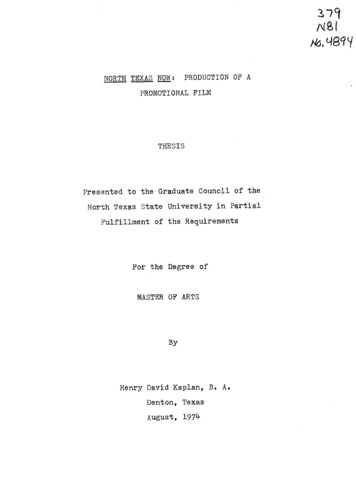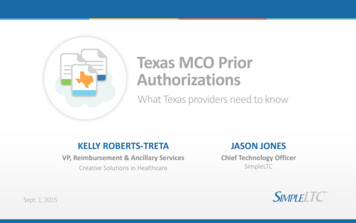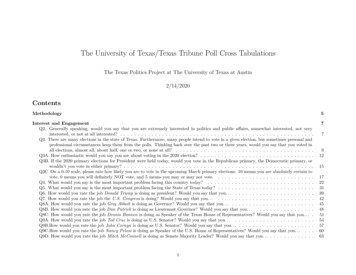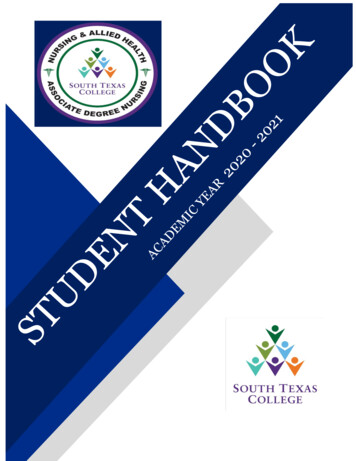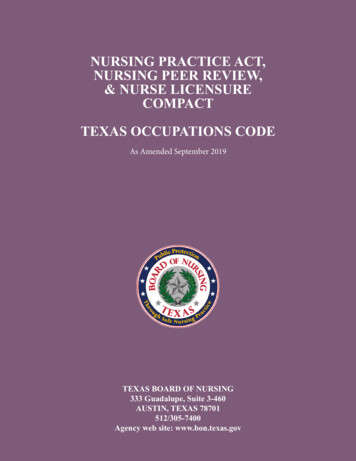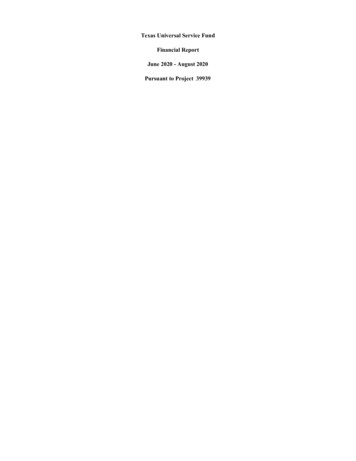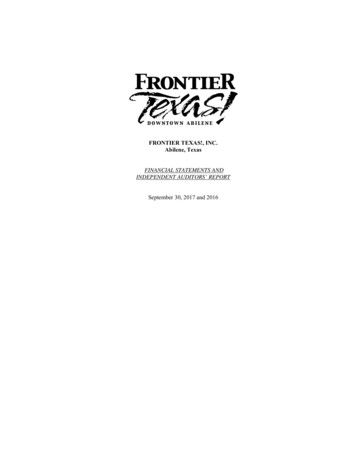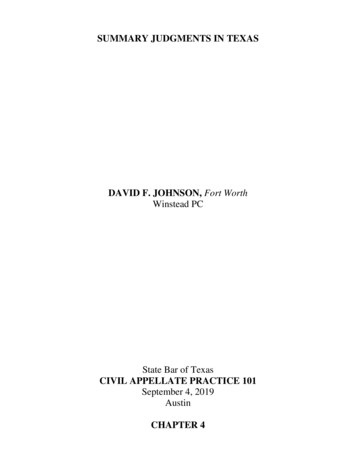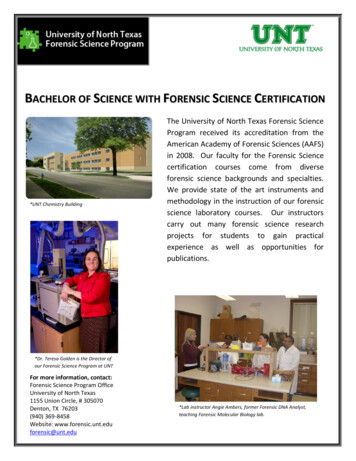
Transcription
BACHELOR OF SCIENCE WITH FORENSIC SCIENCE CERTIFICATION*UNT Chemistry BuildingThe University of North Texas Forensic ScienceProgram received its accreditation from theAmerican Academy of Forensic Sciences (AAFS)in 2008. Our faculty for the Forensic Sciencecertification courses come from diverseforensic science backgrounds and specialties.We provide state of the art instruments andmethodology in the instruction of our forensicscience laboratory courses. Our instructorscarry out many forensic science researchprojects for students to gain practicalexperience as well as opportunities forpublications.*Dr. Teresa Golden is the Director ofour Forensic Science Program at UNTFor more information, contact:Forensic Science Program OfficeUniversity of North Texas1155 Union Circle, # 305070Denton, TX 76203(940) 369-8458Website: www.forensic.unt.eduforensic@unt.edu*Lab instructor Angie Ambers, former Forensic DNA Analyst,teaching Forensic Molecular Biology lab.
ABOUT OUR PROGRAMFORENSIC SCIENCE CERTIFICATION COURSESThe University of North Texas Forensic Science Program isa natural science undergraduate accredited forensicscience programs located in Texas. Our accreditation isthrough the Forensic Science Education ProgramAccreditation Commission of the American Academy ofForensic Sciences.The Forensic Science Program offers forensic sciencecoursework that covers the following topics: courtroomtestimony, introduction to law, quality assurance, ethics,professional practice, evidence identification, collection,processing, and a survey of forensic science as well asclasses in forensic chemistry, forensic biology, physicalmethods, and forensic microscopy. Forensic scienceinternships and research opportunities are also requiredof students in the Forensic Science Program.The undergraduate program in Forensic Science at theUniversity of North Texas offers a strong curriculum basedon the natural sciences that has been in place for over 50years. In addition, the Forensic Science Program has welldefined goals that are supported by the forensic basedcoursework that forms the core of the program. Overall,the Forensic Science curriculum ensures that eachstudent: Obtains a thorough grounding in the naturalsciences,Builds upon this background by taking aseries of more advanced science classes, andDevelops, through course work andlaboratory-based instruction, an appreciationof issues specific to forensic science.COURSEWORKThe Forensic Science Program is made up of three tracksincluding a Bachelor of Science in Biology, a Bachelor ofScience in Chemistry, and a Bachelor of Science inBiochemistry. The B.S. in Biology includes a chemistryminor and the B.S. in Chemistry and Biochemistry includea biology minor. Each degree requires 121 - 126 credithours with over 50 advanced hours in the sciences. AForensic Science certificate is awarded with thecompletion of each degree.The undergraduate degree is considered to be aninterdisciplinary degree and has associated with itextensive laboratory work in both biology and chemistry,regardless of the core track. Introduction to CriminalisticsCriminal InvestigationBiomedical CriminalisticsForensic Molecular BiologyForensic MicroscopyInstrumental AnalysisForensic ChemistryEthical Issues in Criminal JusticeForensic InternshipINTERNSHIPSInternships are a great way to become involved and gainexperience in forensic science while still taking courses,whether it is doing research or working in a crimelaboratory. Several internships are available for studentsto develop hands on experience and gain valuable skills intheir particular field.Internship opportunities include, but are not limited to: Forensic Chemistry LabsForensic DNA/Genetics LabsCrime LabsForensic ToxicologyForensic AnthropologyForensic MicroscopyCrime Scene Investigations
Forensic Science Program Director1155 Union Circle #305070Denton, TX 76203Tel: (940) 369-8458Fax: (940) 565-4318Email: forensic@unt.eduDear Sir or Madam:Thanks for your recent inquiry about our Forensic Science Program at the University ofNorth Texas (UNT). We are enclosing our program application form and degreerequirements for the Chemistry, Biology, or Biochemistry options. You are also invited tovisit our website at www.forensic.unt.edu which provides many of the answers yourequested.Please do not hesitate to contact us if you have any questions about our program. We willbe happy to assist you.Thank you again for your interest in our program and hope to hear from you soon.Sincerely,Forensic Science Program DirectorEncl.
The University of North Texas is proud to offeran exciting new program that prepares studentswith the knowledge and experience needed toestablish a career in Forensic Science. Thisundergraduate degree combines the Bachelor ofScience degree in Chemistry, Biology, orBiochemistry with extensive interdisciplinaryapplications, providing students with the toolsneeded to thrive in this stimulating field.For more information about this programVisit our website at www.forensic.unt.edu,Visit the Forensic Science Office on campus in CHEM 207B,Or email us at forensic@unt.edu.
How to apply to the Forensic Science Program:1. Choose a major in biology, chemistry, or biochemistry.2. Fill out an application. The application can be rensic.unt.edu, or picked up in the Forensic ScienceProgram Office located in the Chemistry Building, Room 207B.3. Return the application to the Forensic Science Program Officeby email (forensic@unt.edu), fax (940-565-4318), mail (ForensicScience Program Director, UNT, 1155 Union Circle #30507, Denton,Texas, 76203), or in person (Chemistry 207B).4. You will be contacted to schedule an appointment tointerview with the Forensic Science Program Director, Dr.Golden. The interview typically lasts 30 min to 1 hour.5. If accepted into the program, set up an appointment fordegree plan advising with the Forensic Science ProgramDirector and the appropriate departmental advisor. This mustbe done each semester until graduation.6. To continue in the program, students must maintain anacceptable grade point average (2.75) and high grades in theforensic science courses and in organic chemistry.Note: Applications are accepted each fall and spring semester.Please check our website for current application deadlines.
FORENSIC SCIENCE CERTIFICATION COURSESThe FORENSIC SCIENCE CERTIFICATE consists of courses covering topics in Forensic science. Thiscertificate includes courses in the Biology, Chemistry, and Criminal Justice departments atUNT.The courses and course descriptions required for the certificate are:CJUS 3330 Introduction to Criminalistics. 3 hours.Overview of the field of criminalistics, with a focus on the recognition, collection,preservation and analysis of physical evidence. Introduction to topics such asfingerprint examination, trace evidence analysis and firearm examination. Prerequisitefor more advanced criminalistics courses. Prerequisite(s): CJUS 2100 or equivalent, orconsent of instructor.CJUS 4360 Criminal Investigation. 3 hours.The study of methods of obtaining and reporting information from the crime scene,victims, witnesses and suspects. Specific attention is given to investigation of indexcrimes (homicide, rape, robbery, assault, burglary, arson, motor vehicle theft andlarceny). Prerequisite(s): CJUS 2100, CJUS 3201 and CJUS 3300 or equivalents.BIOL 3331 Biomedical Criminalistics. 3 hours.Survey of the various forensic sciences with emphasis on direct examination of humanremains and directly related biological evidence; e.g. anthropology, pathology,odontology. Students learn how cases arise, i.e. how remains are located, recoveredand processed. Supporting biological, clinical and physical sciences will also becovered; e.g. toxicology, entomology, DNA science, forensic geology/palynology andremote sensing. Prerequisite(s): CJUS 3330 or consent of department.BIOL 4240 Forensic Microscopy. 3 hours.Introduction to microscopic analysis with emphasis on the fundamentals necessary foridentification and characterization of trace evidence materials such as glass, hair,fibers, explosives, soil, paint, and biological samples. Prerequisite(s): successfulcompletion of a minimum of 60 semester hours; 8 hours organic chemistry; CJUS 3330;BIOL 3331; BIOL 3451/3452, and admission to Forensic Science Certificate program.BIOL 4590 Forensic Molecular Biology. 3 hours.Intensive laboratory course designed to give students experience and expertise in thebasic molecular techniques currently utilized by the majority of forensic laboratoriesperforming forensic DNA analysis. Prerequisite: BIOL/BIOC 4570.CHEM 4631/4632 Instrumental Analysis w/ lab. 4 hours.Principles and theory of chemical analysis utilizing absorption spectroscopy in UV,visible and IR regions, nuclear and electron spin resonance, mass spectrometry,chromatography, polarography and other advanced instrumental techniques.Prerequisite(s): CHEM 3451, 3452 and concurrent enrollment in CHEM 4632.CHEM 4351 Forensic Chemistry w/ lab. 3 hours.Analytical chemistry applied to forensic science. Statistics and error analysis, samplingtechniques and instrumentation, pharmacology and toxicology, materials chemistry,combustion, analysis of drugs and physical evidence. Prerequisite(s): CHEM 2380,3451/3452.BIOL 4900/CHEM 4900 Forensic Internship. 1-3 hours.Several internships are available for students who wish to develop hands on experienceand gain valuable skills in their particular field including, but not limited to: forensicchemistry, DNA analysis labs, and crime labs. An application must be filled out in orderto be eligible.Continued on back
FORENSIC SCIENCE CERTIFICATION COURSESIn addition to the courses necessary for the Forensic Science Certificate, students may alsoobtain a Criminalistics Certificate by taking the following courses:CJUS 4390 Crime Scene Investigation Theory. 3 hours.Designed to provide a thorough understanding of the scientific theories involved in therecognition, documentation, preservation and collection of physical evidence at crimescenes. Crime scene documentation methods included are digital imaging (still andvideo), note taking, sketching and crime scene mapping. Safety considerations andbiohazard concerns are emphasized. Proper evidence collection techniques and chainof custody issues are presented. The theory of crime scene reconstruction according tothe scientific method is developed. Field exercises are used to further develop lecturetopics. Prerequisite(s): CJUS 3330 or equivalent or consent of instructor.CJUS 4370 Advanced Criminalistics I. 3 hours.*Advanced examination of specified sub-disciplines of criminalistics, including analysisof firearms/tool marks, footwear/tire tread evidence, and bloodstain patterns.Provides students with an understanding of the scientific method of analysis, thetheory of individualization, and the application of critical thinking as applied to thesesub-disciplines. Prerequisite(s): CJUS 2100/3330 or equivalents, or consent ofinstructor.CJUS 4380 Advanced Criminalistics II. 3 hours. *Advanced examination of specified sub-disciplines of criminalistics, including analysisof latent prints, trace evidence and controlled substances. Designed to providestudents with an understanding of the scientific method of analysis, the theory ofindividualization, and the application of critical thinking as applied to theses subdisciplines. Prerequisite(s): CJUS 2100 and CJUS 3300 or equivalents, or consent ofinstructor.CJUS 3340 Computer Crime. 3 hours. *Introduction to computer crime through an examination of the crime and thoseindividuals committing it, as well as the specific laws, investigative techniques, andcriminological theories applicable to computer crime.* Students must take 2 courses from the CJUS 4370, CJUS 4380 and CJUS 3340 options, but donot have to take all three courses for the Criminalistics Certificate.
Undergraduate Advisor:Dr. Guido VerbeckChemistry Building, Room 207C(940) 565-3554gverbeck@unt.eduUNIVERSITY OF NORTH TEXASCOLLEGE OF ARTS AND SCIENCESBACHELOR OF SCIENCE (BS)IN CHEMISTRY WITH A FORENSIC SCIENCECERTIFICATIONForensic Program Director:Dr. Teresa Goldenforensic@unt.eduChemistry, Room207B(940) 369-8458http://www.forensic.unt.eduNOTE: This degree is only for Chemistry majors that have been accepted into the UNT Forensic Science Program. Required Minor:Biology. The student must see the Program Director and an advisor for their official degree plan.credithoursCHEMISTRY (45 hrs)General (1410, 1420; and labs: 1430, 1440). 8or Honors General (1413, 1423; and labs: 1430, 1440)Organic (2370, 2380; and labs: 3210, 3220) . 8Quantitative Analysis (3451 and lab 3452) . 4Physical Chemistry (3510, 3520; and labs: 3230, 3240) . 8Advanced Inorganic (4610) Fall Only . 3Advance Inorganic Lab (4620) Spring Only . 11Instrumental Analysis (CHEM 4631 and lab: 4632) Spring Only . 4Additional hours at senior level (4xxx) . 9Biochemistry I (4540 – to satisfy ACS certification requirements)Forensic Chemistry (CHEM 4351) Spring OnlyForensic Science Internship (CHEM 4912)advancedhours2483149MATHEMATICS (13 hours)Calculus I & II (1710 & 1720) . 7Probability Models (1780) . 3Multivariable calculus (2730). 3NOTE: Without sufficient math competence, student will have to complete MATH 1100, 1650PHYSICS (8 hours)Gen. Technical (1710, 2220; and labs: 1730 and 2240) . 8BIOLOGY MINOR (21 hours)Principles of Biology I (1710 and lab 1730) . 4Biology of Microorganisms (2041 and lab 2042) . 4Genetics (3451 and lab: 3452) . 4Forensic Microscopy (BIOL 4240) Fall Only . 3Biomedical Criminalistics (BIOL 3331) Spring Only . 3Forensic Molecular Biology (4590) . 34333FORENSIC SCIENCE CERTIFICATE COURSES (19 hours FSAT exam required)Biomedical Criminalistics (BIOL 3331) Spring Only . (3)Criminal Investigation (CJUS 4360) . 3Forensic Microscopy (BIOL 4240) Fall Only . (3)Forensic Chemistry (CHEM 4351) Spring Only. (3)Instrumental Analysis w/ lab (CHEM 4631 and lab 4632) Spring Only . (4)Forensic Molecular Biology (4590). (3)(3)3(3)(3)(4)(3)ADDITIONAL FORENSIC SCIENCE REQUIREMENTS (9 hours)Introduction to Criminalistics (CJUS 3330) 3Ethics in Science (PHIL 2600) .(3)Ethical Issues in Criminal Justice (CJUS 3700) or Contemporary Moral Issues (PHIL 1400) . (3)3(3)(3)UNIVERSITY CORE REQUIREMENTS (33 hours)ENGLISH COMPOSITION & RHETORIC (ENGL 1310 and TECM 2700) . 6VISUAL OR PERFORMING ARTS (See D on other side) . 3HUMANITIES (PHIL 2600) . 3UNITED STATES HISTORY (HIST 2610 and 2620). 6AMERICAN GOVERNMENT (PSCI 1040 and 1050) . 6SOCIAL AND BEHAVORIAL SCIENCES (CJUS 2100 Crime and Justice in the U.S.) . 3DISCOVERY COURSE (CJUS 3700 or PHIL 1400). . . 3CAPSTONE COURSE (CHEM 4912) . . . . .(3)(3)TOTAL hours shown from above .12350Note: Hours in parenthesis count toward 2 requirements .3/14/14
Undergraduate Advisor:Dr. Mark BurlesonBiology Building, Room 128(940) 565-3627biology@unt.eduUNIVERSITY OF NORTH TEXASCOLLEGE OF ARTS AND SCIENCESREQUIREMENTS FOR THE BACHELOR OFSCIENCES (BS) IN BIOLOGY WITH A FORENSICSCIENCE PROGRAM CERTIFICATIONForensic Program Director:Dr. Teresa Goldenforensic@unt.eduChemistry, Room 207B(940) 369-8458http://www.forensic.unt.eduNOTE: This degree is only for Biology majors that have been accepted into the UNT Forensic Science Program. RequiredMinor: Chemistry. The student must see the Program Director and an advisor for their official degree plan.credithoursBIOLOGY (43 hours)Principles of Biology I and II (1710/1720 and labs: 1730/1740) . 8Biology of Microorganisms (2041 and lab 2042). 4Genetics (3451 and lab 3452) . 4Cell Biology (3510 and lab 3520) . 4Biomedical Criminalistics (BIOL 3331) and Forensic Microscopy (BIOL 4240) . 6Animal Physiology (BIOL 3800 and lab: 3810) . 4Biochemistry and Molecular Biology of the Gene (4570) and Forensic Molecular Biology (4590) . 6Elementary Biochemistry (BIOC 3621 and lab: 3622) . 4Forensic Science Internship (BIOL 4900) . 3advancedhours4464643MATHEMATICS (7 hours)Calculus I (1710). 411Elementary Probability and Statistics (1680) or Probability Models (1780) . 3NOTE: Without sufficient math competence, student will have to complete MATH 1100, 1650PHYSICS (8 hours)General or Technical(1410 & 1420 and labs: 1430 & 1440; or higher . 8CHEMISTRY MINOR (20 hrs)General Chemistry (1410, 1420; and labs: 1430, 1440) . 8or Honors General Chemistry(1413, 1423; and labs: 1430, 1440)Organic Chemistry (2370, 2380; and labs: 3210, 3220) . 8Quantitative Analysis (CHEM 3451 and lab 3452) . 424FORENSIC SCIENCE CERTIFICATE COURSES (19 hours FSAT exam required)Biomedical Criminalistics (BIOL 3331) Spring Only . (3)Criminal Investigation (CJUS 4360) . 3Forensic Microscopy (BIOL 4240) Fall Only . (3)Forensic Chemistry (CHEM 4351) Spring Only. 31Instrumental Analysis w/ lab (CHEM 4631/4632) Spring Only . 4Forensic Molecular Biology (BIOL 4590) . (3)(3)3(3)34(3)ADDITIONAL FORENSIC SCIENCE REQUIREMENTS (9 hours)1Introduction to Criminalistics (CJUS 3330) . 3Ethical Issues in Criminal Justice (CJUS 3700) or Contemporary Moral Issues (PHIL 1400) . (3)Ethics in Science (PHIL 2600) . (3)3(3)(3)UNIVERSITY CORE REQUIREMENTS (33 hours)ENGLISH COMPOSITION & RHETORIC (ENGL 1310 and TECM 2700) . 6VISUAL OR PERFORMING ARTS (See D on other side) . 3HUMANITIES (PHIL 2600 Ethics in Science) . 3UNITED STATES HISTORY (HIST 2610 and 2620). 6AMERICAN GOVERNMENT (PSCI 1040 and 1050) . 6SOCIAL AND BEHAVORIAL SCIENCES (CJUS 2100 Crime and Justice in the U.S.) . 3DISCOVERY COURSE (CJUS 3700 Ethical Issues in Criminal Justice or PHIL 1400). . 3CAPSTONE COURSE (BIOL 4900) . . . .(3)(3)TOTAL hours shown from above. 12150Note: Hours in parenthesis count toward 2 requirements1These classes satisfy the Foreign Language Option II for this degree3/14/14
Undergraduate Advisor:Dr. Mark BurlesonBiology Building, Room 128(940) 565-3627biology@unt.eduUNIVERSITY OF NORTH TEXASCOLLEGE OF ARTS AND SCIENCESREQUIREMENTS FOR THE BACHELOR OFSCIENCE IN BIOCHEMISTRY WITH AFORENSIC SCIENCE CERTIFICATIONForensic Program Director:Dr. Teresa Goldenforensic@unt.eduChemistry, Room 207B(940) 369-8458http://www.forensic.unt.eduNOTE: This degree is only for Biochemistry majors that have been accepted into the UNT Forensic Science Program .Required Minor: Biology. The student must see the Program Director and an advisor for their official degree plan.credithoursadvancedhoursBIOCHEMISTRY (14 hrs)Biochemistry I (4540) . 3Biochemistry II (4550) . 3Biochemistry Laboratory (4560) . 2Biochemistry and Molecular Biology of the Gene (4570) and Forensic Molecular Biology (4590) . 63326CHEMISTRY (26 hrs)General (1410, 1420; and labs: 1430, 1440). 8or Honors General (1413, 1423; and labs: 1430, 1440)Organic (2370, 2380; and labs: 3210, 3220) . 8Quantitative Analysis (3451 and lab 3452) . 4Physical Chemistry (3510 and 3520) . 6246MATHEMATICS (10 hours)Calculus I & II (1710 & 1720) . 711Elementary Probability and Statistics (1680) or Probability Models (1780) . 3NOTE: Without sufficient math competence, student will have to complete MATH 1100, 1650PHYSICS (8 hours)General or Technical(1510, 1520 and labs: 1530, 1540; or 1710, 2220 and labs: 1730 and 2240) . 8MINOR (22 hours)Principles of Biology I (1710 and lab 1730) . 4Biology of Microorganisms (2041 and lab 2042) . 4Genetics (3451 and lab 3452) . 4Cell Biology (3510 and lab 3520) . 4Forensic Microscopy (BIOL 4240) Fall Only . 3Forensic Science Internship (BIOL 4900) . 34433FORENSIC SCIENCE CERTIFICATE COURSES (19 hours FSAT exam required)Biomedical Criminalistics (BIOL 3331) Spring Only . 3Criminal Investigation (CJUS 4360) . 3Forensic Microscopy (BIOL 4240) Fall Only . (3)Forensic Chemistry (CHEM 4351) Spring Only. 31Instrumental Analysis w/ lab (CHEM 4631/4632) Spring Only . (4)Forensic Molecular Biology (4590) . (3)33(3)3(4)(3)ADDITIONAL FORENSIC SCIENCE REQUIREMENTS (9 hours)1Introduction to Criminalistics (CJUS 3330) 3Ethics in Science (PHIL 2600) .(3)Ethical Issues in Criminal Justice (CJUS 3700) or Contemporary Moral Issues (PHIL 1400) (3)3(3)(3)UNIVERSITY CORE REQUIREMENTS (33 hours)ENGLISH COMPOSITION & RHETORIC (ENGL 1310 and TECM 2700) . 6VISUAL OR PERFORMING ARTS (See D on other side) . 3HUMANITIES (PHIL 2600) . 3UNITED STATES HISTORY (HIST 2610 and 2620). 6AMERICAN GOVERNMENT (PSCI 1040 and 1050) . 6SOCIAL AND BEHAVORIAL SCIENCES (CJUS 2100 Crime and Justice in the U.S.) . 3DISCOVERY COURSE (CJUS 3700 or PHIL 1400). . . 3CAPSTONE COURSE (BIOL 4900) . . . .(3)(3)TOTAL hours shown from above . 12656Note: Hours in parenthesis count toward 2 requirements1These classes satisfy university foreign language requirements3/14/14
University of North TexasApplication for the Forensic Science ProgramStudents wishing to obtain a B.S. in chemistry, biology or biochemistry with a Forensic Science Certification should completethis form. The completed form should be returned by mail or email to the Forensic Science Program Office at the address listedbelow. The student must realize that this form in no way serves as application to the University; it is an application forconsideration for admission into this program only. Please read the Important Information Section below before filling out thisform.In addition to this application entering freshman must have their science teacher forward a letter of recommendation to theaddress given below, and must plan to take the SAT or ACT tests (Verbal and Quantitative) and request that the scores be sent tothe Forensic Science Office.Name:Address:Email Address:Home Phone Number: Alternate Phone Number:UNT ID #:Current Status (check one)Transfer Student:Incoming Freshman:Post Baccalaureate:Current UNT student:(Please include your transcripts of transfer courses)(Please include your high-school transcripts)Current School Attending:If high school: anticipated semester of entry to UNT:If UNT student: expected graduation date:*For Entering Freshman OnlyScience Teacher Sending Letter of Recommendation: (With Address and Phone Number):Name:Address:Phone number:SAT Scores: Critical Reading: Math: Writing:ACT Scores: Math: Reading: Science: English:If you have not taken the SAT or ACT exam, please indicate date you plan to take the exam:*For both entering freshman and UNT st
Return the application to the Forensic Science Program Office by email (forensic@unt.edu), fax (940-565-4318), mail (Forensic Science Program Director, UNT, 1155Union Circle #30507, Denton, Texas, 76203), or in person (Chemistry 207B). 4. You will be contacted to schedule an appointment to interview with the Forensic Science Program Director, Dr.
